

Aorakinet-Cantatech Collaboration Project/Southern Central Divide Regional Educational Cluster/Southern Central Divide Blended Learning Proposal. Southern Central Divide Blended Learning Proposal By Vicki Smith ePrincipal WestNet Trevor Storr ePrincipal Aorakinet Darren Sudlow ePrincipal Cantatech March 5, 2010 Nomenclature Broadband Investment Initiative Extending Higher Standards Across Schools Hyper Text Markup Language.
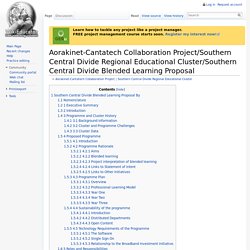
Inclusive learning - Google Search. Activity theory. Activity theory (AT; Russian: Теория деятельности)[1] is an umbrella term for a line of eclectic social sciences theories and research with its roots in the Soviet psychological activity theory pioneered by Lev Vygotsky, Alexei Leont'ev and Sergei Rubinstein.
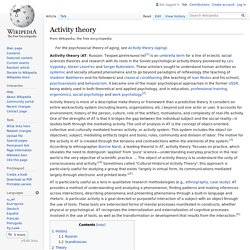
These scholars sought to understand human activities as systemic and socially situated phenomena and to go beyond paradigms of reflexology (the teaching of Vladimir Bekhterev and his followers) and classical conditioning (the teaching of Ivan Pavlov and his school), psychoanalysis and behaviorism. It became one of the major psychological approaches in the former USSR, being widely used in both theoretical and applied psychology, and in education, professional training, ergonomics, social psychology and work psychology.[2] Activity theory is more of a descriptive meta-theory or framework than a predictive theory. It considers an entire work/activity system (including teams, organizations, etc.) beyond just one actor or user. Variation theory: A theory of learning and a useful theoretical framework for chemical education research - Chemistry Education Research and Practice (RSC Publishing) DOI:10.1039/C2RP20145C.
Received 24th October 2012 , Accepted 26th November 2012 First published on 11th December 2012 Instructors are constantly baffled by the fact that two students who are sitting in the same class, who have access to the same materials, can come to understand a particular chemistry concept differently. Variation theory offers a theoretical framework from which to explore possible variations in experience and the resulting differences in learning and understanding. According to variation theory, there are a limited number of features of a given phenomenon to which we can pay attention at any given time. Our experience of that phenomenon depends on the specific features to which we direct our attention. Introduction How is it that two students who are sitting in that same class on the same day with access to the same materials can come to understand a chemical concept (or any concept for that matter) differently? Background. D is for John Dewey: His Approach To Education - The Positive Encourager.
Closing the gap: test and learn. PrimarWebQuest in foreign language education. Center for the Collaborative Classroom. Center for Research on Learning. Learning Strategies brochure (pdf) Learning strategies are used by students to help them understand information and solve problems.
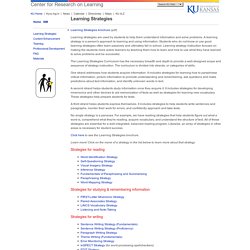
A learning strategy is a person's approach to learning and using information. Students who do not know or use good learning strategies often learn passively and ultimately fail in school. Learning strategy instruction focuses on making the students more active learners by teaching them how to learn and how to use what they have learned to solve problems and be successful. The Learning Strategies Curriculum has the necessary breadth and depth to provide a well-designed scope and sequence of strategy instruction.
One strand addresses how students acquire information. A second strand helps students study information once they acquire it. A third strand helps students express themselves. No single strategy is a panacea. Click here to see the Learning Strategies brochure. Variation Theory. Learning Study | Variation Theory | Universitas 21 Fellowship | Variation Theory Conference Variation Theory was initially develop by Professor Ference Marton and is a theory of learning.
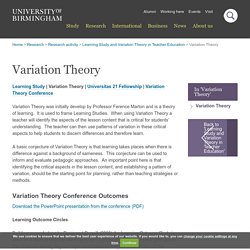
It is used to frame Learning Studies. When using Variation Theory a teacher will identify the aspects of the lesson content that is critical for students’ understanding. The teacher can then use patterns of variation in these critical aspects to help students to discern differences and therefore learn. Microteaching, an efficient technique for learning effective teaching. Unterkunft — Website. Lesson Study Research Group Home Page. This center is no longer updated, it is being kept online for archival purposes only.
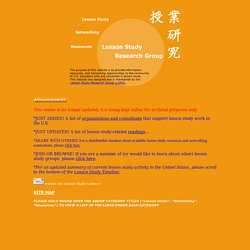
*JUST ADDED! A list of organizations and consultants that support lesson study work in the U.S. *JUST UPDATED! A list of lesson study-related readings... *SHARE WITH OTHERS! *JOIN OR BROWSE! *For an updated summary of current lesson study activity in the United States, please scroll to the bottom of the Lesson Study Timeline. <<Join the Lesson Study Listserv! PLEASE HOLD MOUSE OVER THE ABOVE CATEGORY TITLES ("Lesson Study", "Networking", "Resources") TO VIEW A LIST OF THE LINKS UNDER EACH CATEGORY. Lesson Study: a handbook. This booklet is a guide on how to use Lesson Study to develop and refine teaching, learning and teacher practice knowledge.
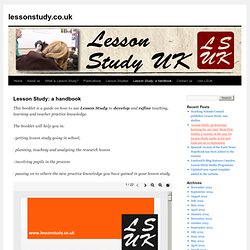
The booklet will help you in: · getting lesson study going in school, · planning, teaching and analysing the research lesson · involving pupils in the process · passing on to others the new practice knowledge you have gained in your lesson study. Download (PDF, Unknown) Download (PDF, Unknown) Download (PDF, Unknown) Download (PDF, Unknown) Eltj.oxfordjournals.org/content/57/3/301.full.pdf.
Loop input. After only a cursory glance online at initial teacher training courses, one recurring selling point immediately stands out: “Learn by doing!”
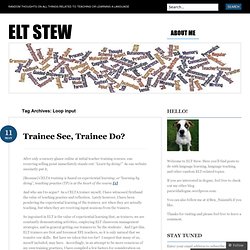
As one website succinctly put it, [Because] CELTA training is based on experiential learning, or “learning by doing”, teaching practice (TP) is at the heart of the course.[1] And who am I to argue? As a CELTA trainer myself, I have witnessed firsthand the value of teaching practice and reflection. Lately however, I have been pondering the experiential learning of the trainees, not when they are actually teaching, but when they are receiving input sessions from the trainers. So ingrained in ELT is the value of experiential learning that, as trainers, we are constantly demonstrating activities, employing ELT classroom management strategies, and in general getting our trainees to ‘be the students’. Balance – When is ELT modelling most useful? Right off the bat I suspect.
The trainees – Who benefits most from explicit ELT modelling? International Journal for Lesson and Learning Studies information. The first journal of its kind, The International Journal for Lesson and Learning Studies publishes lesson and learning studies that are pedagogically aimed at improving the quality of teaching and learning in formal educational settings.
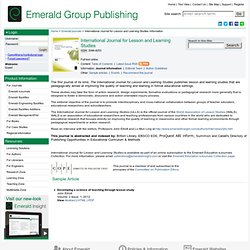
These studies may take the form of action research, design experiments, formative evaluations or pedagogical research more generally that is designed to foster a democratic, discursive and action orientated inquiry process. The editorial objective of the journal is to promote interdisciplinary and cross-national collaboration between groups of teacher educators, educational researchers and schoolteachers. The International Journal for Lesson and Learning Studies (IJLLS) is the official journal of the World Association of Lesson Studies (WALS). Read an interview with the editors, Professors John Elliott and Lo Mun Ling at.